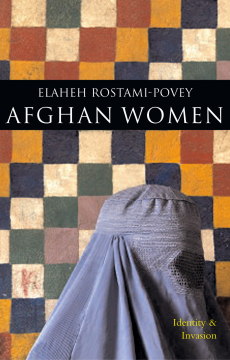
Additional Information
Book Details
Abstract
Through years of Taliban oppression, during the US-led invasion and the current insurgency, women in Afghanistan have played a hugely symbolic role.
This book looks at how women have fought repression and challenged stereotypes, both within Afghanistan and in diasporas in Iran, Pakistan, the US and the UK. Looking at issues from violence under the Taliban and the impact of 9/11 to the role of NGOs and the growth in the opium economy, Rostami-Povey gets behind the media hype and presents a vibrant and diverse picture of these women's lives. The future of women's rights in Afghanistan, she argues, depends not only on overcoming local male domination, but also on challenging imperial domination and blurring the growing divide between the West and the Muslim world. Ultimately, these global dynamics may pose a greater threat to the freedom and autonomy of women in Afghanistan and throughout the world.
'Elaheh Rostami-Povey demonstrates in this important and powerful book that US intervention has not led to any dramatic improvement in the status of women. Highly recommended for understanding the situation of Afghan women, their efforts to represent themselves, and their rejection of stereotypes'
Eric Hooglund, Bates College
'This volume addresses unasked but fundamental questions about post-conflict development in Afghanistan. Elaheh Rostami-Povey offers important analysis and moving illustrations of the difficulties faced by women there. It is vital reading for those wishing to understand aid and reconstruction.'
Haleh Afshar, University of York
Using Afghan women's voices, Elaheh Rostami-Povey holds a mirror up to the West. The picture, though increasingly familiar, of Human, in particular Women's Rights being used to mask Imperialist warfare does not make comfortable viewing. This respectful but forceful book demonstrates how urgent it is that at least the feminism of the privileged must, once again, confront and change itself. The intellectual argument of Afghan Women is made through a portrait of what is happening on the ground in such a way that one is able to see and think at the same time - an exemplary integration of empirical and analytical work. Truly an important book.'
Juliet Mitchell, University of Cambridge
'There are few subjects more timely than this study of Afghan women and few people more qualified to examine them...Afghan women in this book are the subjects of history, not passive objects waiting for the condescension of Western liberals. We hear in their own words what they feel about their lives, and how they struggle to achieve education and any sort of independence.'
Lindsey German, Socialist Review
'An important book'
'Peace and women's rights activists will benefit from reading this accessible resource.'
Peace News
Elaheh Rostami-Povey is a lecturer in development studies at SOAS, University of London. Her research focuses on gender issues in Iran and Afghanistan. She is the author of Women, Work and Islamism: Ideology and Resistance in Iran (1999), which was published under her pen name Maryam Poya. This book was then translated into Farsi and published in Iran in 2001 under her own name.
Table of Contents
| Section Title | Page | Action | Price |
|---|---|---|---|
| Cover\r | Cover | ||
| Contents | v | ||
| Acknowledgements | vii | ||
| Glossary | ix | ||
| Acronyms | x | ||
| Preface | xi | ||
| Map of Afghanistan | xii | ||
| 1 | Introduction | 1 | ||
| Gender, ethnicity, agency and identity | 3 | ||
| A short history | 9 | ||
| The structure of the book | 13 | ||
| Notes | 15 | ||
| 2 | Resistance and struggle under the Taliban | 16 | ||
| Communal identity and gender relations | 17 | ||
| The civil war and the Taliban period | 19 | ||
| The experiences of Afghan women under the Taliban | 26 | ||
| Women’s survival strategies | 28 | ||
| Notes | 38 | ||
| 3 | Under invasion | 40 | ||
| International security forces | 47 | ||
| The UN and international NGOs | 50 | ||
| The state, foreign private companies and the warlords | 53 | ||
| The opium economy | 55 | ||
| Women and reconstruction | 59 | ||
| Education | 65 | ||
| Returned refugees | 67 | ||
| Pornography and Bollywood | 70 | ||
| Is Afghanistan better now? | 74 | ||
| Notes | 78 | ||
| 4 | Exile and identity | 80 | ||
| Migration to Iran and Pakistan | 80 | ||
| Migration to the USA and the UK | 89 | ||
| Diasporic consciousness in Iran and Pakistan | 94 | ||
| Exile, history and Afghan futures | 98 | ||
| Changing gender relations in the context of Islamic culture | 102 | ||
| Diasporic consciousness: the impact of 9/11 and 7/7 | 111 | ||
| Conclusion | 126 | ||
| Notes | 127 | ||
| 5 | Challenging domination | 129 | ||
| The imperial agenda | 137 | ||
| Notes | 142 | ||
| Bibliography | 143 | ||
| Index | 153 |
